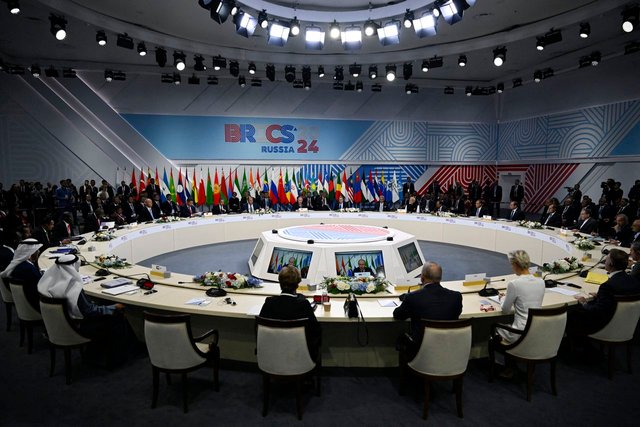BRICS: A Bright Opportunity or Economic Trap for Indonesia?

On January 6, 2025, Indonesia was officially accepted as a member of BRICS (Brazil, Russia, India, China, and South Africa) after previously submitting its application to join this increasingly influential global economic alliance. As the largest developing country in Southeast Asia, Indonesia sees great opportunities in joining this group, but it must also be prepared for the challenges that come with membership. This article will discuss the reasons behind Indonesia's decision to join BRICS, the potential impact on its economy, as well as the risks and future projections.

What is BRICS?
BRICS is a group initially made up of four large countries—Brazil, Russia, India, and China—which was later joined by South Africa in 2010. The formation of BRICS aims to create a platform for developing countries to enhance their positions in the global economy, which has traditionally been dominated by advanced countries like the United States and members of the G7.
The main focus of this group is to strengthen economic cooperation and trade among its members, with the goal of reducing dependence on the global financial system controlled by Western nations. BRICS also aims to offer alternatives to the dominance of the US dollar, including proposals to create a shared currency for use in trade among BRICS countries. This is expected to provide greater economic stability for its member nations.
Why Did Indonesia Apply to Join BRICS?
Indonesia’s decision to apply and eventually join BRICS is driven by several strategic reasons, primarily to strengthen its economic and geopolitical position. One of the main motivations is to improve Indonesia's economy by gaining access to new markets. BRICS represents over 40% of the global population and nearly 25% of the global economy, offering Indonesia a chance to expand trade and business with other developing countries in the group.
Additionally, Indonesia hopes to reduce its dependence on Western countries, particularly in terms of the financial systems and payments dominated by the US dollar. With the possibility of BRICS developing an alternative currency, Indonesia could diversify its economic relations without fully relying on the US dollar, which is often influenced by the policies of major countries like the United States.
Moreover, Indonesia expects to gain more political support in international forums. BRICS provides a platform for developing countries to have a stronger voice on global issues such as climate change, sustainable development, and reforming global institutions like the IMF and the World Bank. As a key player in Southeast Asia, Indonesia could leverage this position to strengthen its international diplomacy.
Economic Benefits for Indonesia
Joining BRICS opens significant opportunities for Indonesia, particularly in the economic sector. With its strategic location in Southeast Asia, Indonesia can play a central role in facilitating trade between BRICS countries and Southeast Asia. Access to BRICS's New Development Bank (NDB), which focuses on financing infrastructure and development projects in developing countries, offers Indonesia a chance to attract large investments in infrastructure and technology.
Additionally, Indonesia could reduce its dependence on Western countries for investment and trade. For instance, trade with China, which is already substantial, could be further expanded using local currencies instead of the US dollar. This could enhance Indonesia's economic stability by diversifying its trade partners.
Challenges and Risks
While the opportunities are plentiful, joining BRICS also comes with challenges and risks. One of the main concerns is the imbalance of power within BRICS. Countries like China and India have much larger economies compared to the other member nations. This raises questions about whether Indonesia, which is relatively smaller in economic terms, can effectively compete with these economic giants.
Furthermore, there is the risk of becoming too reliant on China, the dominant player in BRICS. This could have negative political and economic implications for Indonesia, especially if China's policies or economic strategies conflict with Indonesia's national interests.
Geopolitically, Indonesia will also need to navigate its relationship with Western countries, especially the United States and the G7 members. Indonesia’s membership in BRICS could potentially strain diplomatic relations, considering the strong ties it has with these countries.
BRICS vs G7 and ASEAN, What’s the Difference?
Geopolitically, BRICS aims to challenge the dominance of the G7, which consists of developed nations such as the United States, Canada, Japan, Germany, France, Italy, and the United Kingdom. The G7 focuses more on policies that prioritize the interests of developed nations, while BRICS seeks to offer a platform for developing countries to have more influence on global economic policies. This creates complexity for Indonesia, which must balance its relationships with both groups.
Moreover, Indonesia's role within ASEAN—its regional organization—must also be considered. As a member of ASEAN, Indonesia needs to ensure that its BRICS membership does not conflict with the interests of the region. ASEAN prioritizes economic integration and regional peace, while BRICS focuses more on advancing the interests of developing nations on the global stage. Synergy between these two organizations could create new opportunities, but also pose challenges in economic and political policies.
Future Projections, What Does It Mean for Indonesia?
If Indonesia successfully leverages the opportunities offered by BRICS, it could strengthen its economic and political position globally in the next 10 to 20 years. By diversifying its trade partners, attracting more investment, and gaining a stronger voice in international forums, Indonesia could reap significant benefits. However, Indonesia must be cautious in managing its dependence on large economies like China to maintain its economic sovereignty.
If BRICS successfully introduces a shared currency, it could bring about significant changes in the global market, including in trade and investment. This new BRICS currency could become a new asset in foreign exchange markets, providing opportunities for Indonesian traders to profit from its volatility. However, the instability of this new currency should also be carefully considered.